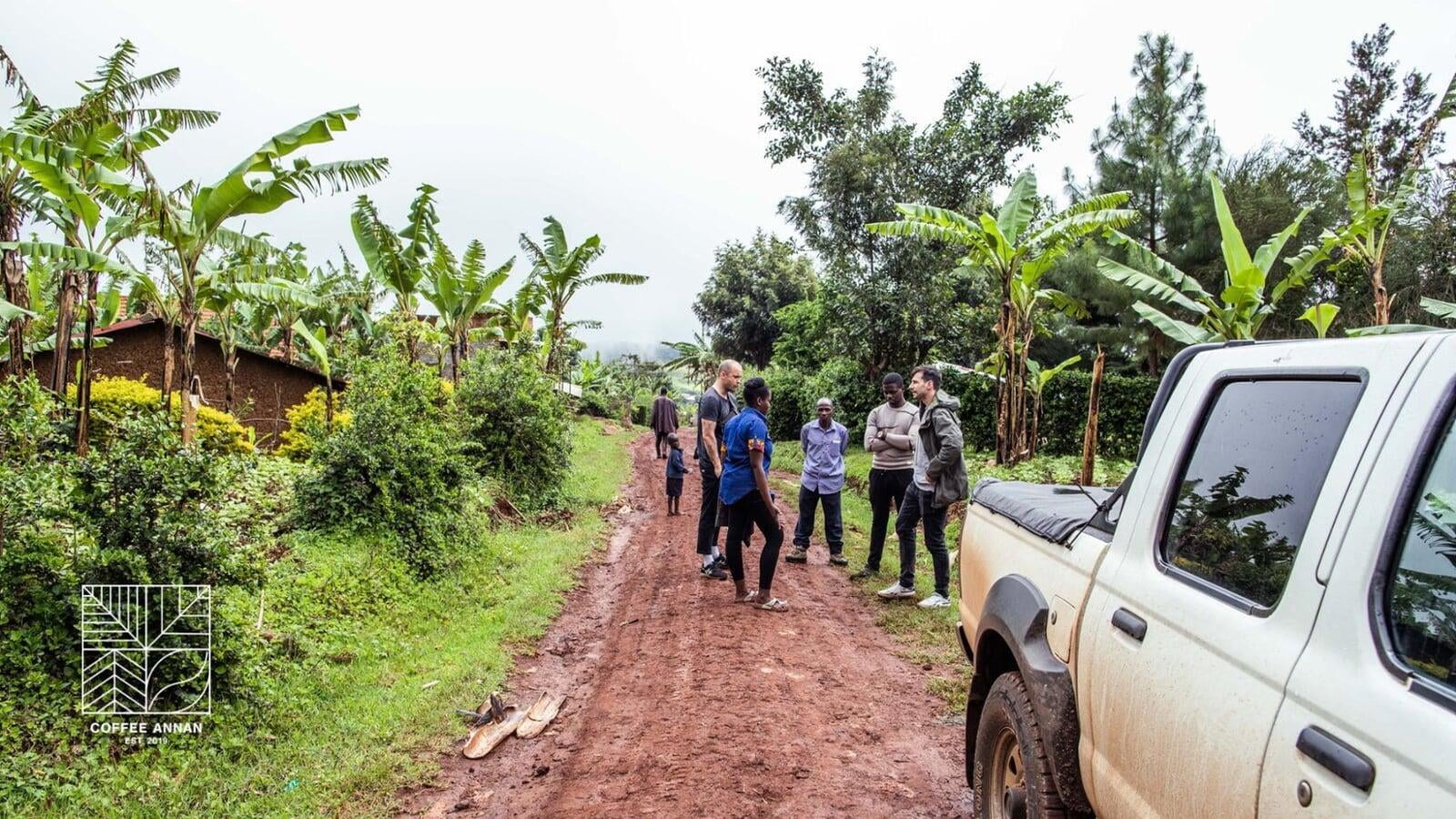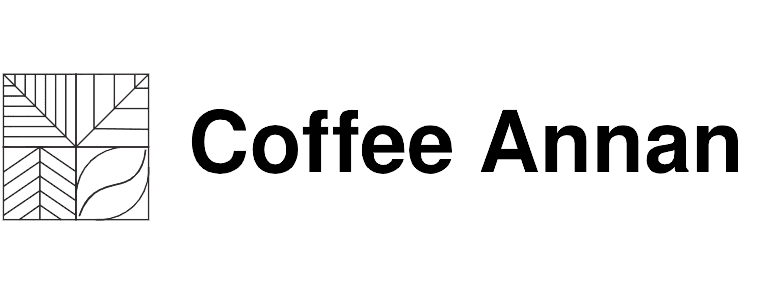Coffee Annan proudly stands for direct trade. Direct trade makes sure that the money you spend on coffee really reaches the farmers: our coffee is not only delicious, but fair and sustainable for farming communities.
I’m Izzy, a writer at Coffee Annan. I love coffee and I want to trust where my coffee comes from. When I’m in the supermarket, I automatically reach for the Fair Trade label – but I’ve never really thought about why…
To get a better idea about the way coffee goes from the farm to my cup, I had a look into Fair Trade, direct trade and everything in between. I wanted to find out how coffee trading has developed into the direct, personal communication Coffee Annan has with its farmers.
The birth of Fair Trade
The first thing I discovered is that the coffee market has always been a thorny question. Before 1989, an international agreement between coffee producing countries and consuming countries – the International Coffee Agreement – monitored the price of coffee across the world. But in 1989, the ICA collapsed. Coffee prices plummeted and farmers stopped being paid. Big corporations like Nestlé and Kraft stepped in to increase coffee production. They made huge profits while slashing the quality of coffee.
That’s where Fairtrade came in.
Fair Trade focuses on closing the gap between small farming cooperatives in developing countries and large farming corporations in industrialised countries. In 1988 the Max Havelaar Foundation, the first Fairtrade Certification Mark, was set up in the Netherlands. By 1997, 17 national initiatives had joined together to create one organisation: Fairtrade International.
Here’s the good news: the Fairtrade label I always look out for in the supermarket is a sign that coffee producers are earning fair wages for their hard work. The Fairtrade label increases the amount we pay for our coffee by regulating the minimum price of coffee beans and including a social premium. This guarantees fair wages for coffee farmers.
Fairtrade certification
Fairtrade International is a wide network that works on alleviating poverty in developing countries. In order to be Fairtrade certified, coffee cooperatives pay an annual fee and follow the 10 principles of Fair Trade. These principles are regulated by non-profit, third-party fair trade associations. They include environmental sustainability methods, ethical business practices, living wages for workers and a ban on child and forced labour.
But I knew it wasn’t that simple. The closer I looked, problems with Fair Trade started to become clear.
A trade-off between sustainability and quality?
The complicated Fairtrade supply chain can actually disadvantage coffee farmers. Cooperatives must use large chunks of profit for Fairtrade inspections and certification. This means that only a small amount is given to farmers themselves because money travels through different levels of the coffee value chain before reaching farmers. According to Helen Naegele, coffee farmers receive only one sixth of the total Fairtrade premium.
I also came across some ethical concerns about the transparency and quality of Fairtrade certified coffee. Coffee buyers often have no direct contact with the farming cooperative and communicate instead with a Fairtrade representative. So it is harder to monitor the quality of the coffee that is being bought, and almost impossible to develop innovative, personal ideas with farmers and roasters.
Direct trade: better for farmers and better for you!
I became familiar with the term ‘direct trade’ when I got started with the team at Coffee Annan. Direct trade grew out of the concerns with the transparency and quality of fair trade that many speciality coffee companies were raising. There is no straightforward definition of direct trade and no single set of standards, but it brings in many of the positive qualities of Fair Trade.
Put simply, direct trade ensures higher quality coffee by building direct and mutually beneficial relationships between coffee producers and buyers.
Direct trade
Direct trade makes sure everyone along the coffee value chain – farmers, roasters and buyers – is aligned. Coffee distributors buy directly from farms and pay more to farmers for special quality standards. The direct channel of communication between buyers and producers allows better negotiations. It also supports long-term relationships, so that farmers and coffee companies can work together on quality, sustainability and fair prices.
After learning so much about the coffee market, I spoke to the team at Coffee Annan to find out more about their own approach to direct trade.
Coffee Annan is constantly evaluating the social impact of its sourcing model – because coffee is delicious, but we know that’s not everything. Authenticity and sustainability are at the heart of Coffee Annan. They take their responsibility to our farmers seriously: their promise of cup quality is tied in with their relationship of trust and transparency with the farms they buy from.
Sustainability is so close to my heart, so it was great to hear that buying coffee from Coffee Annan is helping develop communities in the long term. Every purchase you make ensures that money really gets back to the farmers, without getting caught up in a complicated chain of exporters and certifications. Coffee Annan pays more than the minimum price of Fairtrade coffee and eliminate the fees of Fairtrade certification. Farmers are paid more, and authentic, high-quality coffee is poured into my cup.
Let’s get personal
I didn’t need to look very far to see how personal Coffee Annan’s approach to direct trade is. Coffee Annan photographer David Hubacher documented the team’s trip across Africa last year. The team visited the farms they source their beans from, learning from local farming communities to cultivate long-term relationships. This is direct trade in its purest form: speaking with farmers, contacting cooperatives and building empowering relationships.

Buying Coffee Annan coffee invites you into the close relationship Coffee Annan is proud to have with its coffee farmers. They purchase coffee beans from Addis Exporter and from the Kata Muduga Farmer’s Cooperative Union in Ethiopia. Founder and CEO Marcel travelled to Kata Muduga in October 2020 to meet Teklu, Coffee Annan’s contact at the farm.
Kata Muduga Farmer’s Cooperative Union
Kata Muduga is traceable and transparent: 90% of the export money goes directly to the farms, while the other 10% goes towards export expenses to help the union grow and develop. As well as providing farmers with fair wages, the money raised by the Kata Muduga group goes towards sustainable social projects in the community. It helps source clean water, construct roads and build schools.
My journey into the world of coffee is only just beginning, but I’m excited to work with Coffee Annan and find out more about what they do. The Coffee Annan coffee culture brings together a higher quality of coffee for you and a higher quality of life for our farmers. Their approach to direct trade puts trust and transparency at its heart. This improves the lives of developing communities and making sure the coffee that ends up in your cup is authentic, delicious and sustainable.
What’s next?
Our coffee comes from genuine relationships. We are looking forward to forming more direct connections with coffee growing communities in Uganda, Tanzania and Rwanda. In May 2020, we visited farms in Kigali, Rwanda to learn more about the growing coffee industry in ‘the land of a thousand hills’. We are currently in the evaluation phase – subscribe to our newsletter to find out more about our newest relationship with the Kigali farming community.
References
The 10 Principles of Fair Trade, World Fair Trade Organization – Europe. 2 Aug 2016.
Helen Naegele, “Where does the Fair Trade money go?” World Development Journal, 2020.
